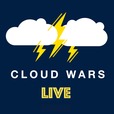
Summary: <p>“<em>Sadin on Digital” episodes explore the fast-changing and high-stakes world of digital business. Wayne Sadin and I focus in particular on what CEOs and boards must do to lead their companies successfully into the Digital Age. Today, we talk 2020. Wayne shares his predictions, ideas and recommendations for boards and the C-suite.</em></p><br><p><strong><u>Episode 12</u></strong></p><p>In this episode: Wayne begins with the term “Shadow IT,” which are systems built within organizations and used without approval. He says, let’s do a little history lesson: In years past there were only mainframes. And then we had minicomputers, and they begat PCs, and people could say, “I can do stuff on this. I just need this thing on my screen.” And that turned into, “Why don’t I share that nice Excel spreadsheet with this other person?” And then that other person shared it with yet another person, and before long it gets published as one of the corporate financials.</p><br><p>Wayne says there is a book by Fred Brooks called “The Mythical Man Month,” and it’s one of the seminal works of managing IT. Wayne says it talks about the notion that if I’m building a system for me it takes X effort. And if I’m building for other people, it takes three times that effort. By the way, Fred Brooks was the architect of the IBM System 360 software package – the biggest software product ever delivered.</p><br><p>He says the problem with databases is they are being hit millions and millions and millions of times a day – or maybe billions if companies have an IoT situation. Organizations have machines sending machine messages, he says, and people don’t want to let end users into the database. He says it’s known colloquially as the query from hell.</p><br><p>He says companies moving to a SaaS-based ERP, and a cloud-based ERP can get multiple benefits. Microsoft, Oracle, Salesforce, Workday, and others have what are called “data lakes,” which are structured and unstructured data.</p><br><p>Wayne talks about “horses for courses” – if you’re changing something that touches the general ledger or is ever reported in external financials to investors or customers, you have to have a level of control. It’s not a free-for-all, and the system will magically keep you from doing a stupid thing when you’re making a calculation.</p><br><hr><p style="color: grey; font-size: 0.75em;"> See <a style="color: grey;" target="_blank" rel="noopener noreferrer" href="https://acast.com/privacy">acast.com/privacy</a> for privacy and opt-out information.</p>
